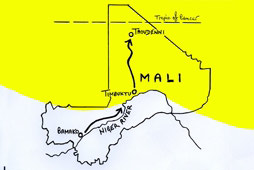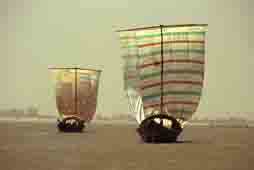
 River Niger
River Niger
 River Niger
River NigerTowards the end of February came news that a pinasse was loading salt to take upriver to Mopti. It seemed fitting to follow Taoudenni’s salt to its next destination, where Moorish stallholders would sell it on to traders from a wide swathe of West Africa. I booked a space among the slabs for the three-day journey.
It has to be said that the big Timbuktu–Mopti freight pinasses have a dubious reputation for safety and timekeeping. Stories abound of sinkings and drownings, and of journeys regularly taking five days or even a week. But with the river now barely a trickle I decided that the risk of drowning, at least, would be pretty low.
I arrived at the port to find 140 slabs stacked neatly in the pinasse – almost three tonnes of salt, the equivalent of a miner’s monthly output. On top of these were 100 or so sacks of rice – another five tonnes – and on top of the rice would sit, eat and sleep the passengers and crew. I noticed the rice sacks were labelled ‘Algerian Solidarity’, and wondered if this was a political statement or a description of their contents.
I knew from my previous time on the river that the pinasses are actually quite lightly loaded when going upstream; most of the traffic (and the sinkings) are in the other direction. As we headed west into the current the crew worked with professional calm; the rice sacks were surprisingly comfortable; and for the whole of the first day and night life looked rosy. Then they switched me to the rustbucket.
I never discovered why the original pinasse pulled up for good at a riverside village in the middle of nowhere. Most probably it was the crew’s home port. Whatever the reason, passengers and baggage were hurriedly transferred, and before I had time to draw breath our new pinasse was under way. It was filthy and leaky. For passengers and crew the oily bilge served as kitchen, living space, bedroom and toilet. A small boy bailed furiously. The previous boat had spent each night moored to the riverbank, but now we kept going through the inky darkness; and this was nearly our undoing, because at 3am one morning I was woken by a bump to find a fountain of water gushing through the hull by my head. A crew member rushed over brandishing a strip of cloth, which he jammed into the crack with a screwdriver. It was obviously something he’d done many times before.
Despite the primitive conditions and scary moments we made good progress, ploughing steadily against the stream. Three times a day one of the crew lit a bonfire in the bottom of the wooden hull (please don’t try this at home), to boil up a cauldron of rice which was then passed round in plastic washing-up bowls. The small boy bailed ever more furiously. In the stern an ancient mechanic passed the time by explaining the workings of the clanking six-cylinder diesel engine to me in measured, beautifully spoken French, as if he were teaching a child its two-times table. This falling-to-bits pinasse and its ragged crew put me in mind of some words of wisdom written by the early Swiss explorer Jean Louis Burckhardt after his 1812 journey from Damascus to Cairo: “I put up every time in the dirtiest caravanserai, took my cloak for a blanket, the earth for a mattress, ate with camel drivers, groomed my own horse – but saw and heard many things that those who travel in comfort will never know.”
As we approached Mopti large flocks of birds started to circle overhead. Although it wasn’t yet March, they were already preparing themselves for the long migration to Europe, where they’d arrive in April or May. Luckily I could get home more quickly; but before doing so there was one more part of Mali I wanted to explore – the famous pays Dogon, or country of the Dogon people.
It’s difficult to say which is more unexpected – the cliffs, caves and grottos of the Bandiagara escarpment south-east of Mopti, or the area’s strangely dressed inhabitants, tending their onion patches and talking endlessly to the spirits of their ancestors in toy huts. Until recently the pays Dogon was one of those African rarities – a traditional culture co-existing and flourishing within a modern state. At first the complete absence of roads meant that outside influence was limited to the occasional government health worker and a handful of determined travellers. In the 1980s, in the face of growing tourism, Dogon elders took the wise decision that visitors should be guided from village to village, and should be asked to bring books for the schools rather than sweets for the children. So was born the world’s first experiment in eco-tourism. But the last ten years have seen a rather less attractive development. Instead of looking after their animals and crops, many young Dogon men now prefer to hang around the tourist bars in nearby cities posing as ‘Dogon guides’.
I’d been harangued in Timbuktu and Mopti by several of these teeshirted, sunglasses-toting rogues; so I chose my own guide carefully, and on the recommendation of a friend engaged the services of Abdina Lougué, a French-speaking 28-year-old. We pored over a map and agreed a five-day walking circuit. Abdina listened attentively to my rather unusual demands – plenty of walking each day, and plenty of space for me to enjoy the Dogon country on my own. We’d just meet up for lunch and in the evenings, when his role would be that of ‘fixer’ rather than guide. “Pas de problème,” he smiled.
The walk didn’t go quite according to plan. Abdina had obviously decided, perhaps rightly, that I was too headstrong to be let loose in the Dogon country on my own. He watched me like a hawk and clung like a limpet. I made several breaks for freedom, but each time I’d round a corner to find him waiting for me, smiling benevolently with just a hint of reprimand in his eyes. He clearly thought me a troublesome charge.
After a day and a half of this I’d had enough. We’d stopped for lunch at a campement in a small village, the last from which Abdina could conveniently return. “Please go home,” I pleaded as gently as I could. “I’ll pay you for three days, plus the expenses we’ve agreed for all five; but I want to carry on alone.”
This arrangement would have left him with more in his pocket than our original plan, so I thought he’d accept it with relief. But I was wrong. Angrily he accused me of dishonouring our contract, to which I pointed out that we hadn’t even talked about having a contract. Attracted by our rising voices, young men from the village quickly gathered round us and joined in. Then an extraordinary thing happened. An older man made his way through the throng and told everyone to sit down. I’d read about traditional Malian ‘people’s courts’, but never expected to witness one – let alone be a party to it.
“I’ve been listening to what’s been going on,” the elder began in French. “Now I have some questions.” Slowly and carefully, he established the gist of what had happened. Then he turned to me and said, “You want to carry on alone, toubab, but I’m afraid that’s not allowed in the Dogon country. You can carry on with your guide, or you can return with your guide the way you’ve come. I suggest you carry on.” Finally he addressed Abdina. “You say you’re a professional guide, but I don’t think you’ve behaved very professionally. You haven’t listened to your toubab. I suggest you start listening.”
In a people’s court both parties have to accept the elder’s judgement; so this was quickly agreed and the crowd dispersed. Abdina and I thanked the elder and continued on our way. But our walk was destined to become even more fraught before it was over. In another village I was cornered by a gang of 20 children demanding handouts (the one moment when Abdina was nowhere to be seen). Later, as I was settling down to sleep on the roof of the campement, the same kids pelted me with stones. Had any village elders been watching these incidents, they’d have approved that I refrained from giving out sweets, but might have frowned as I lobbed stones back at the little monsters in the gathering dusk.
All in all, I felt shamefully relieved when the five days were up and it was time to return to the outside world. I’d come to the Dogon country naively hoping for a casual stroll among people who’d give a cheery wave before turning back to watering their onions. But tourism brings changes – tourists are infinitely more interesting than onions, especially if they come carrying gifts. In the escarpment villages those gifts seem to have been particularly plentiful, and I was left with the feeling that here, at least, the wonderful Dogon way of life has probably gone for good.
Looking back on it, my unhappiness was probably inevitable – you can’t go straight from the Sahara to Mali’s foremost tourist honeypot and not feel a little overwhelmed. There would be more adjustments to make the following week as I flew from a sweltering Bamako to a shivering Paris. I inhaled a final whiff of Mopti’s fishy waterside, said my goodbyes to the Moorish salt traders, and turned for home.
